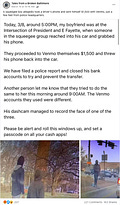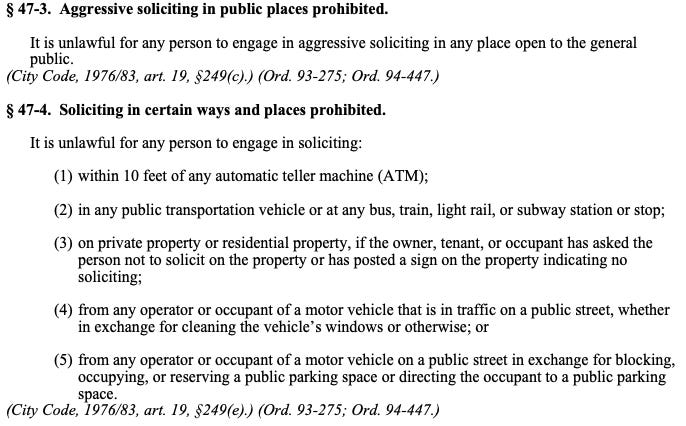What kind of robber wields a washcloth on a stick and takes your iphone only to promptly return it after sending himself a stack and a half of your digital cash via Venmo? Why a gen Z Baltimore one of course.
That’s right — according to a post on the Facebook page, Tales from a Broken Baltimore, last Tuesday, when a commuter came to a stop at the intersection of President and E Fayette, a squeegee boy reached into his car, took his phone, sent himself a $1500 Venmo payment, and then tossed the phone back as though nothing had happened.
A truly modern reimagining of a most timeless criminal activity.
Tis a natural progression in the evolution of petty street theft. As commerce goes entirely cashless, thievery must follow suit.
Soon street level robbers will be coming for your Bitcoins, demanding that you hand over your BitWallet and the keys to your encryption.
And while the absurdity of this story and its quality of being so uniquely of our time does make for a twinge of humor, the issue of the squeegee boys and the motorists they badger is indeed gravely serious.
Back in 2019, a woman told police that a group of squeegee kids surrounded her car in threatening fashion, striking her vehicle and demanding money after spraying fluid on her windshield. When she grabbed a firearm out of her purse preparing to defend herself, one of the kids reached into her car, prompting a struggle that ended in gunfire.
And then there is this video from 2020, showing a squeegee boy beating on a motorist who exited his vehicle in response to the squeegee boy smacking on his windshield. (32 to 45 seconds mark)
These unfortunate occurrences cut the other way too.
Last year one motorist was so adamant that a squeegee kid not wash his windshield, that he got out of his car and beat the kid bloody with a baseball bat.
And infamously, years and years ago now, one squeegee kid was run over by a tractor trailer and killed.
Clearly the current setup is failing the squeegee boys and motorists alike.
And then of course there is the city at large to consider. With a shrinking population and an increasingly depleted tax revenue base, the last thing Baltimore needs is yet another deterrence preventing would be commuters and tourists from coming through.
So what is the city to do?
Well you know my beloved late grandmother grew up in the city in the 1940s – on Luzerne Avenue in Patterson Park. One night when I was a kid, while she was letting me beat her at checkers, she told me about how she would scrub all of her neighbor’s marble front doorsteps for a quarter a piece.
Eventually, she’d save up enough quarters to go and buy herself a brand new dress. Because otherwise, being the fourth of six daughters born to a modest earning father employed by Bethlehem Steel welding ships together, the only clothes coming her way would be hand-me-downs.
Now are the squeeee boys and their windshield wiping really any different from my grandmother and her doorstep scrubbing?
As it turns out – yes, they are different. There is one massively important distinction between the two.
And it has nothing to do with skin color, either, as those would sew racial division might have you believe.
The difference between the commercial practices of my grandmother and the squeegee boys comes down to this – mutual consent.
Yes it is mutual consent that distinguishes a voluntary transaction from a coercive one. Both seller and purchaser must agree to transact.
Before my grandmother got down on her hands and knees and sponged those front doorsteps pristine clean, like she ended up doing every week for an old Polish widow down the street who paid in both cash and licorice sticks, she would first knock on her door and ask if she could do so, for a fee.
This foundational step in the commercial process is generally absent from the workflow of the squeegee boys.
Now I understand that acquiring consent takes time, and that the squeegee boys are operating under real constraints in that regard – a red light only stays red for so long.
But still, that doesn’t change the essential properties of voluntary commerce.
So with that in mind, perhaps new legislation is needed to mandate accordingly?
Nay.
No come to find out, as I was doing a bit of research for this piece, the city already has ordinances in place which ban aggressive soliciting in public, and the solicitation of drivers in traffic — both fitting descriptions for the practices of the squeegee boys if ever there were one.
But then to the contrary, Baltimore police officers have revealed on camera that city leadership have basically told them to stand down when it comes to intervening in matters of the squeegee. (6:15 to 7:30)
So then maybe the solution to this specific dilemma, and so many others like that plague the city, can be found by reconciling with the obvious answer to this one simple question — why have laws if we aren’t going to enforce them?
And to those of you reading this who would consider me callous, insensitive to the plight of the squeegee boys by suggesting that the outlawing of their main hustle actually be enforced.
To you I would say this — is it really that unreasonable to think that the city’s young people and the communities they live in would be better served if these youth spent more of their time in school, or working a job where customers actually consent to purchase their services?




